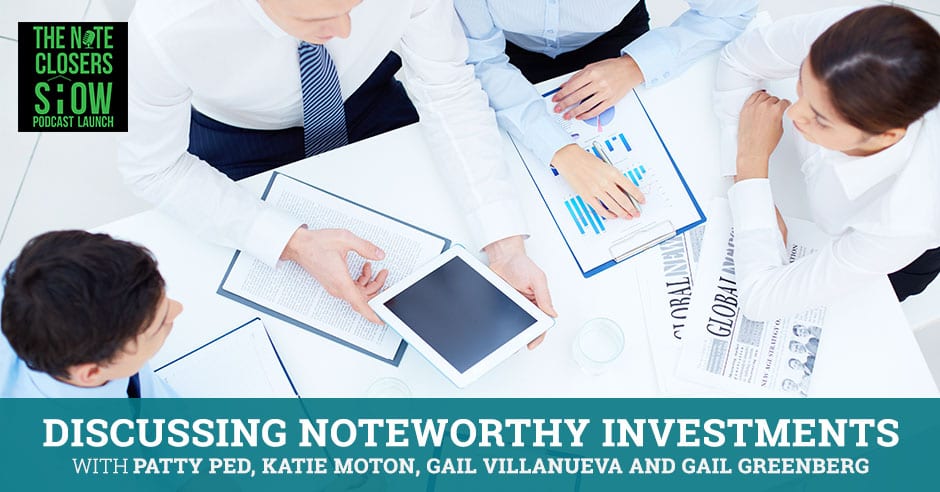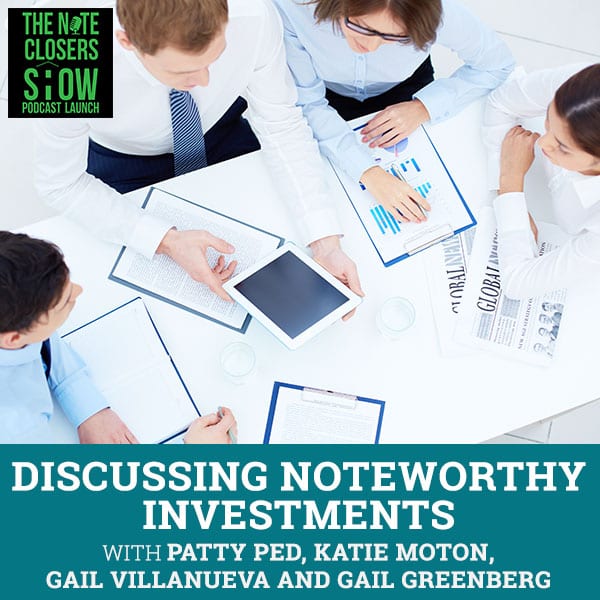
Girls at a young age get the most positive attention for being good students. Upon reaching adolescence, the need for acceptance and to feel valued kicks in. Girls then become very risk averse. They don’t want to step over the line at all. It becomes kind of a habituated behavior to not take risks. Now as adults, can women ever succeed in the high-risk world of note business? How do we compete with the big boys in making noteworthy investments? Guest hosts weigh the pros and cons of being women investors in a panel discussion with Patty Ped from Aider Financials, Katie Moton of Coletta’s Street Capital, Gail Villanueva of Noteworthy Investments and Gail Greenberg of Win Win Notes.
Patty Ped runs Aider Financials with her husband, who first got her hooked on mortgage notes. They started off with real estate, doing rentals and buying homes. Now they’re specifically doing non-performing first mortgages.
Katie Moton together with Colletta’s Street Capital has invested in several notes. They are now co-managers of the fund, boasting almost $2 million in properties.
Gail Villanueva has been a licensed real estate agent since ’84; but the market changed. When everybody was zigging towards overbidding on rehabs, Gail decided to zag into notes. How many notes? Noteworthy Investments just closed on their eighth note, going from zero to 17,500 miles an hour. That’s what you need to do achieve orbit.
Guest host Gail Greenberg is a social media expert. One of the things that Gail did at Note CAMP was running daily promotions to see who puts out the most creative posts. At the end of it, she won the grand prize of having a year membership for the Note Mastermind and came to a Fast Track training, which she leveraged to kick-start her way into the note industry.
—
Listen to the podcast here
Discussing Noteworthy Investments With Patty Ped, Katie Moton, Gail Villanueva and Gail Greenberg
We have a particularly lovely team of co-hosts keeping the seats warm while Scott and Stephanie make their way across Europe. With me are fellow note investors who also happened to be ladies. Patty Ped from Aider Financials, Katie Moton of Coletta’s Street Capital and Gail Villanueva of Noteworthy Investments. I’d like to give everyone a chance to take a turn and tell us a little bit about themselves. Ladies, please say what you’ve done so far in notes, what your big, audacious, hairy goal is and then tell us something we’d be surprised to know about you. Katie, why don’t you go first?
My name is Katie Moton. I’m with Colletta’s Street Capital. Coletta Streets has invested in several notes and we have teamed up with a fund. We are now co-managers of the fund and we have about almost $2 million in properties in that fund. We closed six or seven and we’re looking to close more. It’s pretty exciting, moving forward and learning so much.
What’s your big hairy goal? The one you’re afraid to say because people will laugh.
I’m pretty open with my goals. Ultimately, we want it so Chris doesn’t have to go back to work. We haven’t announced this yet, but I took a year off of teaching and we decided that I’m not going back either, so that’s something new. I’m going to stick with doing the note business full-time, but Chris has to go back to work. Our goal is ultimately not have him have to get back to work either. That’s where we are. That’s a big announcement, I’m not going back to teaching.
Patty, tell us about yourself.
I’m Patty Ped. I’m with Aider Financials. My husband got me hooked to mortgage notes. At first, I thought it was just this the shiny new thing that he was after. Once I got into it, once I learned a little bit about it, I was hooked, so we’ve been investing. We started off with real estate. We were doing rentals and buying homes and everything. We then started in the second space. We started with performing second mortgages just to dip our feet in and see what’s going on. We loved it. We started with non-performing seconds and then moved onto non-performing firsts and now, we’re specifically doing non-performing first mortgages. It’s been a great experience because I was doing this full-time and I’ve spent literally spent hours trying to learn the business, talking to people, networking, and working with everybody. Not everybody, but most of the industry. It’s been great. I love it. I’m thoroughly enjoying myself here.
What is your hairy audacious goal?
Similar to what Katie just shared, a few years after we started investing, I went back and took up a full-time job. I want to be able to scale up this business to such a level that I wouldn’t have to continue doing the full-time job.
$100,000 or $200,000 per year. What do you think?
It kept changing.
What would surprise us about you?
I do have one thing. Not many people know that I sing sometimes. I’ve given some concerts and stuff. Indian classical music. I’ve sang in a movie in India.
We’ll be watching that at the next Mastermind. Gail, you’re up.
I was doing fix and flips for many years, very successful. I’m a licensed real estate agent. I’ve been an agent since ’84 but the market changed. When everybody was zigging towards overbidding on rehabs, I decided to zag into notes. I looked at performing and non-performing. I took quite a few classes in performing notes and then I decided that non-performing notes were more exciting, so I jumped into that. During one of my note Meetups here in central Florida, I met a Scott Carson student who said he was doing things. I said, “I want to go ahead and do that.” I started training under Scott and haven’t looked back. I absolutely loved it. We closed on our eighth note. I went from zero to 17,500 miles an hour. That’s what you need to do achieve orbit.

Noteworthy Investments: If you look at our parents’ generation, women were never taught the finances. It was the man’s job in a lot of cases.
That might probably be the thing that people would be most interested to know about you, that you worked for NASA. What did you do for them? I understand you single-handedly put a man on the moon.
Not quite. It’s a cast of about 20,000 people that used to fly the shuttle. I started in 1991 with NASA. I’m very proud of the fact that I helped to build the Space Station. I was in the environmental office and I used to fuel the rockets until the shuttle program ended. They then put me in the safety office, and the contractors are taking over, which is good and that’s fine, but I decided to go ahead and put in my retirement. I retired and I had to pick a date. April Fools’ Day seemed like the perfect day and that’s when I left after 26 years. I immediately started working in real estate doing rehab. I have a portfolio that we hold right now.
What’s your big audacious hairy goal?
My husband and I and granddaughter have a 33-foot sailboat. Unfortunately, I blew my shoulder out on it. After years and years of sailing, I’m going to be constantly susceptible to injuries. We decided to change our 33-foot sailboat into a 31-foot Coachmen Leprechaun and travel throughout the country. It gets pretty dark out here in Central Florida, so we decided that we can just hole up in the mountains because it’s a very portable business. That’s my big audacious goal. I want to try to do that. I’m so convinced that I’m going to be successful that I’ve booked already into Fort Wilderness in an RV that I don’t own.
I’m glad to be here with you, ladies. I don’t know how many note conferences you’ve been to, but I have been struck all along. You go to a note conference and it’s 75% men usually. The women who are there, some of them are spouses who are there being supportive and they’re not active note investors. Then there are lovely ladies like Shante Duffy who’s there as a vendor, so when you get down to how many women are note investors, it seems tiny. My first question to you is why do you think that is? If women are 50% of the population, why are they 15% or 20% of note investors? Along with that, why are you different so that you’re doing it and other people aren’t?
It’s our society and the way we’re raised as girls, what girls are pushed into. If you look at our parents’ generation, women were never taught the finances. It was the man’s job in a lot of cases. A lot of women allowed the man to be the supportive role and to deal with the finances. I was that woman. I let Chris do everything and he’s like, “We’re going to invest in this.” I’m like, “I trust you.” It’s like, “Whatever you say.” When he got the orders to deploy, it put a lot on us. I don’t even know if I knew our bank account login information. It’s simple things like that. I was like, “You’ll be going to Kuwait for ten and a half months and I don’t know anything about our finances.” We talked, we have a budget and everything like that but I never logged in.
When he deployed, you were at that level of not knowing anything?
Yes, I had nothing to do with investments. I was a teacher and Chris managed our finances. He did everything and he did a wonderful job. He always talked to me about investments. We chose to do it, but it was more like me trusting him. He then asked me to do this with him so I’ve been doing notes for a total of a year. I’ve been actively investing for a year now. I’ve been learning a lot. I feel like it took Chris saying, “Katie, let’s do this together and come to me to Fast Track.” I was like a deer in the headlight, the whole Fast Track. It took him asking me to be part of this. He and I were talking about how much he loves that I’m a part of it with him. He knows so many other note investors whose wives aren’t and they really liked the fact that we are a team and that we’re doing it together. They wish their wives did it with them. That’s a lot of it. A lot of women allow the husband to do it.
I have the opposite problem. My husband doesn’t want to come anywhere near this. Patty, you come from a traditional culture where women are not necessarily running the show. Do you think it is a cultural thing about women in roles?
Probably not so much culture but like Katie said, we’re not used to participating on the financial part of things. In my family, especially my mom and dad and similar to what Katie said, they would sit down together once a month, go over the finances, and decide where they’re putting their money, investing together, and that kind of thing. We did have a little bit of that. My dad was regularly investing in real estate so I always had an inclination for that. When I got married, my husband was similar. He was the more active investor. He would go out and read up about everything there is. Stocks, bonds, and the usual stuff, and then tax liens and basically everything. He would educate himself first. He would come home and discuss that with me and he’s like, “I came across this one, let’s do this,” or, “This is what I’m thinking.”
That would add to other discussions. I think from what I’ve seen, I see most of them in the role of vendor or I think I see a lot of women realtors. I don’t know if this has been your experience. When we were in marketing, I try to focus a little bit on that and I say, “You don’t actually have to go house to house and you don’t have to take up so much work.” There is a way to passively invest and make much more money in this field. That’s part of my education or marketing strategy here. I try to educate other women about this field. I wouldn’t say less work, but I would say less physical work this involves.

Noteworthy Investments: There is a way to passively invest and make much more money in this field.
I’m obviously a little bit older than they are, but I had the opposite effect. My dad and uncle owned real estate offices out in San Francisco, so I started being a person that they look to clean their rentals and everything, paint them and get them ready. Rehabbing had been in my blood for a very long time. I see that in real estate. Being a traditional realtor, there are a lot more women and it seems that people will trust us to help them find their nest, if you will. That’s in the traditional site. I saw more commercial agents on the male side. I heard Scott tell us there are only 4,000 note investors throughout the entire United States. I see it as a mix with half and half. Maybe that’s the events that I’ve been to. Maybe it leans more towards the male side.
From my perspective, as far as my personal experience, my husband has absolutely nothing to do with investments. He has absolutely nothing to do with the money. My mom and sister both died when I was very young, so I ended up striking out on my own when I was only about sixteen. I grew up having to make sure that my finances were in order and everything. When it came down to finding our properties and finding that, I said, “Just sign this. Trust me on this one.” When I got to notes, he fully understood why because he was out there estimating our jobs and there weren’t any jobs to estimate. With the notes, he listens, he hears these things and he’s like, “Your learning curve is like swoosh,” and I’m like, “Yes, it is. Go ahead and sign this one because this is your note now.”
It’s the same dynamic I’ve got going on like, “It’s okay. I’ll figure it out.”
I wouldn’t say it’s a gender thing. It’s more of a personality verse and how you were raised and what you were exposed to when you were younger too.
I actually heard a very interesting talk recently about how girls at a young age get the most positive attention for being good students, for being well behaved, and all these things. When they reach adolescence and that need that you have for acceptance and to feel valued is kicking, girls become very risk-averse. They don’t want to step over the line at all. It becomes a habituated behavior to not take risks. You then become an adult and you have to almost make a conscious decision to break out of that programming. I certainly felt it. Gail and I are going to be doing a podcast about blockages. The ones that interest me the most are the ones that I’ve identified in myself that I never understood were there. You’re all very conscientious, hardworking, detail-oriented women who look at a deal before you make a decision to jump in. I was that way too. I always thought that idea of analysis paralysis wasn’t real, that I was doing what I should be doing to make sure everything is perfect. At a certain point when you are unable to make a decision that you know enough and it’s now time to do something, you have to start asking yourself, “What is really going on with me?” This isn’t about being cautious, this is about being too scared to make a move.
It’s always good to have the data so that you can analyze it. I come from an analytical type of a mindset here, but there gets to be a point where you have enough data to make a decision. Do you keep asking for more data or do you go ahead and say done is better than perfect?
The biggest problem is that people don’t recognize this. They feel whatever they feel is reasonable. I actually want to just stop a second because ever since Katie said she’s involved with a fund, I think we’ve all been like, “Fund? How does that work exactly?” What’s that all about, Katie?
A friend of ours who is also a fellow note investor got us into this. He started a fund and he asked us to help manage it, and so we are now part of the managing. We didn’t set up the fund. We didn’t start the fund, so I don’t have a lot of details about that aspect of it, but it is a closed fund. We have the money already there in the fund.
Closed fund means that you raise all the money and that’s it?
It goes in and then it’s closed. I’ve been talking to them about what happens when you spend all that money. Where do you go? Because you can’t get more money to put into that fund. That’s been a conversation we’ve been having about starting another fund because you can’t bring more money into a closed fund. What’s nice about a closed fund versus an open fund is it’s cleaner in the sense all the money goes in and everyone gets the equal shares based on how much money they put in. If you have an open fund, new money’s coming in constantly and you’re having to figure out how to pay each person differently and what property was purchased before they put their money in and everything like that.

Noteworthy Investments: It becomes a habituated behavior to not take risks.
What are your particular duties, you and Chris, in terms of this fund? What do you do?
It’s nice because there are three of us, so we all take on different roles. My role is more on the due diligence side. That’s been my big focus. When we get the tape in, we’re focusing on doing the due diligence and that kind of stuff. It’s nice because you don’t have to stress about going and finding a JV partner or finding funds. You already have the funds there. What’s nice about having the fund is that we have a lot of money so we’re able to get tapes that other people aren’t able to get because we’re purchasing and making a lot more bids on the tape first for other people buying onesies and twosies.
I find that places like Rock Top, they have a minimum purchase of $2 million, but they’re scaling it up. Their minimum purchases they said is going to be $10 million.
It’s all about relationships. Our other partner has formed some great relationships with some people that were getting tapes in that aren’t being distributed every month to everybody on the email list. That’s been helpful too.
Katie, did you say you’re buying first non-performing loans?
Yes, we buy first non-performing.
You’re not investing in REOs or other real estate?
No, we’re not. We do some condos. Our other partner, he’s comfortable with condos and stuff like that because he’s done more of those; but we do try to stick to single-family residents.
Your fund gives a preferred interest. Is that how it works for the investors?
I’m not on that part of it. I’m in the part where I’m doing the due diligence and we’re deciding whether to purchase and looking at the ROI’s and everything like that.
Katie, we have a question about your fund. Is it only with accredited investors?
Yes.
Do you ladies think that there’s any advantage to being a woman in this business? I might just be first on that. I thought there would be. Patty said on her webinar that she was excited to be in this business because she thought a lot about helping people and being kind and that was important. I definitely had that motivation too. My entire motivation to build wealth is to not just secure my own existence and help my family, but also to be a philanthropist. It’s been a delightful surprise to me to find out that I feel like I’m already being a philanthropist with some of my borrowers. It’s very gratifying. I have a lot of great borrowers. Most of my borrowers are women, which I find interesting, either young single mothers or widowed or divorced older women. I feel there’s a natural rapport there and that is helpful.
I remember when I first started doing this, I have a friend locally who’s a note investor and I was asking him, “What is your process when you get a note?” He’s like, “I just start legal immediately with anyone.” That sounded terrible but now I’m starting to think like that’s not such a crazy idea. That’s what people are. If people are going to make deals with you and be reasonable, starting legal brings them to you a little faster and it doesn’t mean that you have to go through with it.

Noteworthy Investments: As women, we do have that certain nurturing quality in us.
I feel like in my relationships with the people that we work with, I never thought about this but I know things about the people that we work with that other people don’t know, even people who’ve known them longer. For example, Franco Borelli, who is an attorney in Ohio that a lot of us use. I happen to know that he has five kids and every summer he takes a big extended family camping trip in Upstate PA. He just bought a ten-person tent and it’s not because they’re planning more kids and gathers everyone in. I know that John Keith does very beautiful woodworking projects using reclaimed barn wood. They’re awesome. I have a natural curiosity and interest in people. I can’t say that it’s gotten me anything extra or whatever, but it certainly makes the business fun.
I bet it has because you probably have their personal cellphone numbers so that you can call them at certain points. I think they have to respond to you faster than someone they don’t really know. When you built up those relationships, you don’t care about using them for their business but them as a person and who they are. It does help you.
I don’t mean to be sexist and cause any controversy here but as women, we do have that certain nurturing quality in us. The empathy, the ability to empathize with the borrower and understand their hardships, that suddenly adds to the conversation when we’re talking to the borrowers. It helps understand their situation a little bit better and I feel it helps me be more creative in what kinds of solutions I can offer to them. When I’m having those conversations I’m like, “If this doesn’t work out, can you do this? Can you do that? How do you feel about doing this kind of thing?” The way we women talk to them or connect with them is different. It doesn’t have to be a woman on the other end, it could be a man, the borrower that we’re talking to. I felt I had built a relationship with the borrowers when I was working with them. It helped them understand that I was here to help them, and I was not this big bank trying to take away their home and throw them on the street.
I have a borrower that I’ve been friendly to and now I feel she’s really using the fact that I’m not scary to make me the last person she pays. I don’t know which bills she’s paying, she’s not paying mine. I had to get tough with her which felt like that’s not how I wanted it to go.
In brain science, women have a thicker cord connecting the two hemispheres of their brain, and because of that, there’s a better information flow, which supposedly allows you to be more complex thinking and a better problem solver. I don’t know if any of you ever saw the show Defending the Caveman, but he also talks about how if you look at aboriginal indigenous tribes, the men’s role in the tribe is to hunt. Their survival depends on them being able to see one animal in the distance and then do nothing else and just go for the animal. Whereas the women are scanning the entire landscape, like, “What can we gather? What can we put together?”
When you talk about the analytical side, Gail, that brings me to the other side of the equation. On the one side, we’re nicer, we’re softer, and we’re empathetic with the borrower. On the other side, when things go all right, we would want to step in and we do take action. I don’t know if it was because of my engineering background, but I do have an analytical mind where I’m looking at the numbers, trying to understand the numbers, and make sense of them. At the end of the day, my investor also needs to be happy with what they’re getting. I think we’re already able to manage a perfect balance being the nurturer and the gatherer and provide a little bit of framework for all of this. That’s what’s great about this particular note industry, that it allows us to be a woman. We don’t have to act like a man to be in this business. We can be ourselves and we can still make profits. We can still make everybody happy.

Noteworthy Investments: We don’t have to act like a man to be in this business. We can be ourselves and we can still make profits. We can still make everybody happy.
There are a lot of businesses where the successful woman is the one who acts the most like a man and I don’t feel like that’s the ticket for entry here.
We have a question that is addressed to all of us. What has been your biggest challenge as a note investor?
I don’t have a thought about what’s been the biggest challenge to me. Particularly when you learn from Scott, the challenge that he presents all of us with is to be great marketers right out of the gate, be great investor relations people, great due diligence people. There’s no crying in notes and there’s no place for mediocrity on the team. It’s hard to figure out when you’re new especially just what to focus on.
I find that having a work-life balance is a little bit of a challenge. My daughter died a few years ago. I have a nine-year old. I still juggle that work-life balance. If it was just me, still it’d be no big deal. I could do what I need to, but we all have to remember that done is better than perfect. That’s what I strive for. She did ask me if I would home-school her and she has a lot of the attributes so that would be a no. We’ll work around school schedules and things like that. No big deal.
Maybe since you’re a full-time investor, your husband would be the one to home-school her and that would work.
That would be a bigger no.
I do relate to the work-life balance thing a little bit especially because I am right now back with a full-time job and I am investing. Earlier, note investing used to be my full-time job. I used to send the kids out the door and my husband out the door at 7:00 AM, then sit down in front of the computer and go until 5:00 PM until I have to go pick up the kids again. I would literally put in all those hours and then take a short break, do dinner and everything, and then get back on the computer again that night because Scott would be online most Mondays, all these other webinars are going on. I used to host a few webinars myself. I used to talk to all these investors. I had to talk to the banks. I would cold call so many banks every day.
The time blocking certainly helped me a little bit where I would say, “Monday I’m just doing builds for the most part unless something really urgent pops up and I have to take care of that part. Tuesday afternoons are solely dedicated to calling banks,” that kind of thing. I managed that a little bit using time blocking strategies. My husband definitely stepped up. He is taking care of most of the things in the house now, especially because I don’t have that eight-hour chunk of time anymore to do all of this. Sometimes when I’m calling banks, I’m doing that in the restroom and during lunch time. It’s a challenge and certainly something that takes a lot of effort initially at least until we figure out how to plan the entire thing and plan our day better.
For me, the challenge was to understand that this is a business that runs on metrics. If you create goals, you have to have a way of measuring your progress towards them. It was a big breakthrough for me. At the beginning, I was just buying whatever looked good and just always trying to maintain a standard for what the ROI would be. I wasn’t just buying anything just to buy something.
Don’t just buy to buy. Right now, because things are getting eaten up at horrible prices, people are just buying to buy.

Noteworthy Investments: Because things are getting eaten up at horrible prices, people are just buying to buy.
There’s a major hate movement underway for people who buy to buy. Dave Potts says this all the time, “These newbies, it’s like in flipping, they don’t know what they’re doing, they’re paying too much, and they’re making the prices go up for everybody.” Sorry Dave, we can’t just eliminate all those people. You’re just going to have to figure out.
I know that the average ROI in my portfolio, I have 40 notes, is 24%. That means that I have ones that are 46% and the lowest is 21%. What 24% means is that for every $1,000 I invest, I get $20 of income every month. If I have an income goal for the month, and I do, I just have to do the math about how many thousands of dollars I have to get invested. If it’s IRA money, I need half as much. If it’s a JV, I’m getting half the deal. That’s a really interesting breakthrough for me. That was the first time I felt I was being strategic in my business and not just floating along and whatever happens, happens.
I wanted to ask you guys to tell some stories if anyone has a crazy, interesting, funny or just particularly good nugget story. I will start because I had something happen to me for the first time. I just think it’s valuable that people know this. In March, I bought a contract for deed in Bay St. Louis, Mississippi. Once it was boarded, the borrower got in touch. She’s about nine months behind and she immediately made a payment that represent almost three months. Already I’m loving this borrower, I’m all about her. She can come for Thanksgiving. She called me and she said, “I made some payments to the previous servicer and I’m not seeing that reflected in my statements.” She’s like, “Could you please call Pam?”
Going back to men versus women, men might be a little bit more. I don’t mean to be unfair but like, “Sure, I’ll call Pam.” I called Pam. Pam tells me that on March 30th, indeed this woman made six payments. She paid $600 on March 30th. I go back and look at my paperwork and I bought it on March 26th. I said to the servicing lady, “You should be transferring that money to my new servicer.” She goes, “No, we don’t do it that way. We credited it against her balance.” This turned into a big hoo-ha on the phone and she escalated me to the head of the office. He was very reluctant to agree that was my money and he was like, “I’m going to have to do some research.” I was like, “I’ll save you the trouble. Here is my email and my wire confirmation.” I eventually got an email from him. I agree that it’s your money. You just have to wring it out of somewhere.” I thought, “Would those people ever have said anything?” It was not reported directly to the new service or they weren’t asking for it. If the borrower hadn’t said something to me, I would not have known that that money was there.
When you say you talked to the borrower, are you talking to the borrower or you mean the servicer?
I want to be clear because this came up after Note CAMP 2 like, “You called the borrowers?” I don’t call borrowers about missed payments. I call borrowers on non-collection related things at times, like taxes. In many states, if the 2017 taxes weren’t paid yet, we’re heading for a tax sale at this point. I need to find out if the borrowers have any ability to pay. I will call them about insurance also after sending force place letters. In this case, the borrower called me. If the borrower calls you, you can talk to them because you’re not chasing them. She called me because she was apparently, with good reason, concerned that she wasn’t being properly credited for her payments.

Noteworthy Investments: Putting more effort in finding a realtor, not a random realtor from that area but someone who really is familiar.
She wasn’t even the name on the loan. They had that part wrong too when the servicing transferred. I’m getting a call from a woman, I don’t know who she is, I don’t know why she wants to pay for this house and the land contract. There are always these kinds of details that get lost and are so crucial. Mind the details. Do you guys have any stories about funny, crazy, interesting, or informational things that happened to you?
We’re looking at purchasing a note in South Carolina and we’ve been trying to get a realtor go by before we fund it because everything looks great from paperwork and online in all our due diligence and all the phone calls we made. We finally got a realtor drive by. She sent the pictures and she actually got up in the windows because we think it’s unoccupied and she’s like, “There were squatters in here.” This is so important with realtors and finding a realtor who’s willing to go and take pictures in the window if it’s not occupied because now we have more to deal with and we can either fade or bid based on these and make it so because we really liked the property. At the same time, we’re able to see the damage done, so getting that realtor who’s willing, we called one and she’s like, “I don’t like going in that area because I don’t want to get bitten by bugs.” We’re like, “You’re not our lady.” We’ve been trying to really focus on realtors who also do fix and flip or who have been involved in fix and flip and really doing a lot more finding the realtors who have done that and they’re willing to go look up in the windows. We have one guy even walk in the house; a different house. The realtor walks right in and take pictures for us. Putting more effort in finding a realtor, not a random realtor from that area but someone who really is familiar.
There are so many realtors who only want to sell pretty houses. The way I try to hit on better ones is on the agent finder on Zillow. It lets you search. There’s an advanced box and you can select short sale foreclosure and things that are problems. I want someone who doesn’t have a problem with problems.
I love Katie’s point where she said she looks for realtors who have done fix and flip. That is perfect because then they can give you what the estimated repair costs are and what the ARV is going to be.
Some may even want to buy them from you.
They may have investors lined up who may be ready or looking in that area.
If you wanted fix and flip, they already have the contractors. They already know people.
I had friend who had acquired a house in North Carolina, had it sold, went to the closing, and everything was great. The new owner went to move in and there were people living there who swore that they had bought the house. This was in North Carolina, I don’t know if South Carolina is as bad, but she went through a living nightmare. The legal costs and the time involved in getting these people out, they’re also living there without water. Just think about the fact that someone can’t flush the toilet and you’ve got the picture. I don’t know how it is in South Carolina, but that may mean if you investigate, Katie, the cost for getting a squatter out of a house that’s in the blue state. I live in a blue state. In Philadelphia, when I was managing student housing in the city, if someone broke in and lived in your house, you had to go through a full eject mints procedure. It was a career squatter who knew the rules and knew how to get the maximum time. It’s a war of attrition. They know how much it will cost you to get them out. You end up offering them $10,000 just to go.
Can you imagine? “What’s your job?” “I’m a professional squatter.”
It pays well and the hours are great.
Anyone else learned a hard lesson or even a fun one?
It’s not hard but it’s fun. I spent a lot of time and effort to learn how to do bind holes, fix and flips and everything. I have found that with statistics saying that it will be about half the time that we’re going to go ahead and have to foreclose. If that would be the case, I have the knowledge base to be able to work both sides. I’m finding in many of the states that I have a network of investors that I’ve worked with over the years, that they’re ready to jump on something that is needing work so I can wholesale it to them. I don’t necessarily need to have a realtor involved because I am a realtor but they can go ahead and buy directly from me so I’ve turned into a wholesaler. I had a case where somebody offered me an REO. I was like, “It’s not that far from my house. I want it.” I love to find houses that are junk and fix them up. That’s just something I’ve always loved to do.

Noteworthy Investments: Have someone who doesn’t have a problem with problems.
That’s like a mommy saying to take an ugly house and make it wonderful again.
I’ve been doing it for close to sadly almost five decades so it’s been in my DNA I suppose because everybody in my family do that. The long and short of it was I wholesale it to a wholesaler. I said, “This is a reverse wholesaler. I decided to reverse engineer the whole process and I’m calling you about this property so there’s enough meat on this bone for all of us.”
That’s a generous and sharing thing too.
You mentioned the scams that people had gone through before. That reminds me of a borrower has sold the property along with a mortgage on it, but it turned out that the person who bought it was based out of Florida, he was just randomly buying houses all over the country, but he wouldn’t take up the mortgage on it. He wouldn’t do the assignment or any such thing. The mortgage was still on the borrower’s name, but the property was on somebody else’s name. They thought they sold the house. They moved their entire family to Florida. They been living there for a few months and then they got this notice from the court saying that they’re due on their mortgage payments and it was a notice of default. It was a really big mess. They have to move their whole family back to Connecticut and they were trying to figure out whose name was on it and what mortgage company currently owned it. Luckily it was us. At that point, it was sold several times meanwhile because nobody knew what was going on there. In the end, we ended up being the lenders on the mortgage.
Our first call, they thought we were scammers. They were very wary about talking to us and we explained the situation. We showed them where we’ve done all the legal paperwork that was required, we did the assignment of mortgage, and everything involved. We were able to show proof that we were the actual lenders on the property. That convinced them and then they were trying to file for bankruptcy because they didn’t want to go through all of this again and they didn’t want it to be a big mess; but we were able to counsel them through the process. We explained that it doesn’t have to be that way. We looked into all the paperwork for them. We helped them through the situation. We figured that they wanted to reinstate the loan at that point. It was a win-win for everybody. The homeowners were so happy because they actually got to keep the home and then we helped them make everything legal and straighten out all of those papers that got messed up over all of those years. For almost a decade, they were struggling with a bad paper and everything became legal and they were really happy.
It’s been great talking to you. I hope the audience have gotten some good nuggets or at least enjoyed this. Thanks so much, ladies. Thank you, Scott, for giving us an opportunity to talk to your community and to represent you.
Thank you, Scott. It was nice talking to you all again.
Thank you for being a big part of it. Thank you for taking time on your busy schedule to be a part of the Note Closers Show. Great job, ladies.
Important Links
About Patty Ped
 Aider Financials is a private mortgage investment firm based in Central Pennsylvania. We are actively seeking 1st position Residential Notes secured by Real Estate.
Aider Financials is a private mortgage investment firm based in Central Pennsylvania. We are actively seeking 1st position Residential Notes secured by Real Estate.
Our mission is to achieve high returns for our investors while offering homeowners unique solutions for their mortgage difficulties, and helping lending institutions liquidate non-performing assets.
About Katie Moton
 Colletta Street Capital LLC is a Nevada base real estate investment firm specializing in 1st Lien Non-Performing Notes on single family residential properties across the United States. Our strategy is to purchase mortgage debt from banks and other lenders and either negotiate with the home owner or borrower to take control the property or turn the note back into a performing loan. Our focus is to create a win-win for the borrowers, the banks, and our investors.
Colletta Street Capital LLC is a Nevada base real estate investment firm specializing in 1st Lien Non-Performing Notes on single family residential properties across the United States. Our strategy is to purchase mortgage debt from banks and other lenders and either negotiate with the home owner or borrower to take control the property or turn the note back into a performing loan. Our focus is to create a win-win for the borrowers, the banks, and our investors.
We source assets from large and small banking institutions, hedge funds and private lenders. If you or your clients are trying to move NPNs before the end of the quarter we would love to talk! Thank you and have a great day!
We have a variety of investment opportunities if you are looking to for investment or joint venture deals. Please contact us directly to find out more information and if you qualify to participate.
About Gail Villanueva
 Gail the Note Gal (Noteworthy Investments, LLC) is a privately held company specializing in the purchase of non-performing debt secured by real estate in most of the major metroplexes and emerging markets across the country. We partner with investors to purchase these assets and deliver to them consistent high returns. All of our investments are secured by the underlying properties and we purchase the non-performing debt at well below market value. We are able to acquire these discounts due to our relationships with banks, hedge funds, and other investors.
Gail the Note Gal (Noteworthy Investments, LLC) is a privately held company specializing in the purchase of non-performing debt secured by real estate in most of the major metroplexes and emerging markets across the country. We partner with investors to purchase these assets and deliver to them consistent high returns. All of our investments are secured by the underlying properties and we purchase the non-performing debt at well below market value. We are able to acquire these discounts due to our relationships with banks, hedge funds, and other investors.
About Gail Greenberg
 On March 10, 2015, the stock market plunged 332 points. Why? Because the economy was SO GOOD that Wall Street players were worried that the Federal Reserve might raise interest rates.
On March 10, 2015, the stock market plunged 332 points. Why? Because the economy was SO GOOD that Wall Street players were worried that the Federal Reserve might raise interest rates.
Does it drive you crazy that your net worth can be slashed at any time by such ridiculous thinking? Me too. That’s why I started investing in real estate myself and why I’m now giving others the chance to do it by Joint-Venturing with me.
I invest in distressed or non-performing mortgage notes. How can you make money investing in a mortgage that no one is paying? I’m glad you asked – I did a video explaining it. See it at http://WinWinNotes.com
Notes pay a much higher rate of interest than a bank, but offer far more security than the stock market. And unlike a stock, the value of a note is never going to plummet overnight because some Wall Street people got nervous.
If you are interested in learning more, please email me at Gail@WinWinNotes.com or call 215.805.1796.

